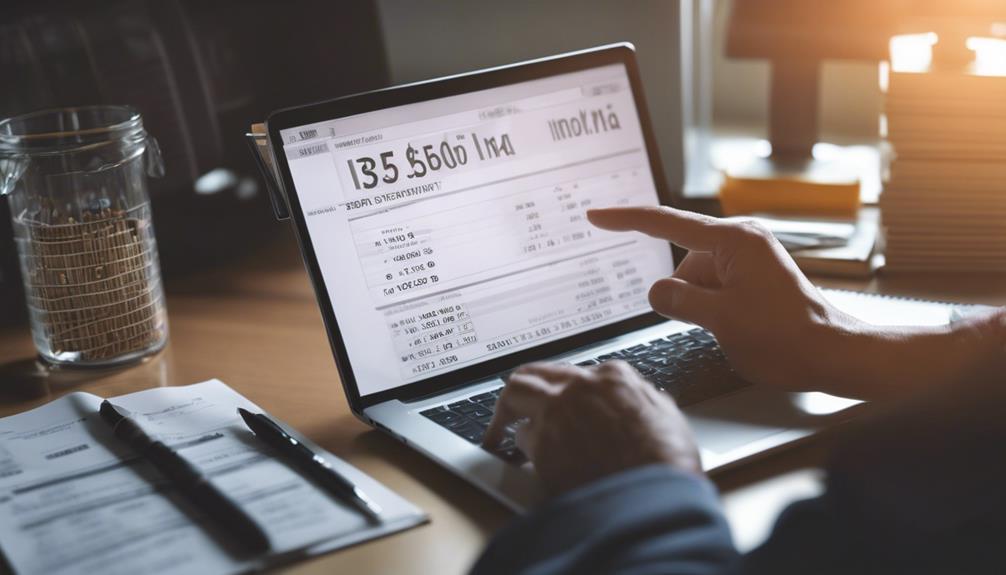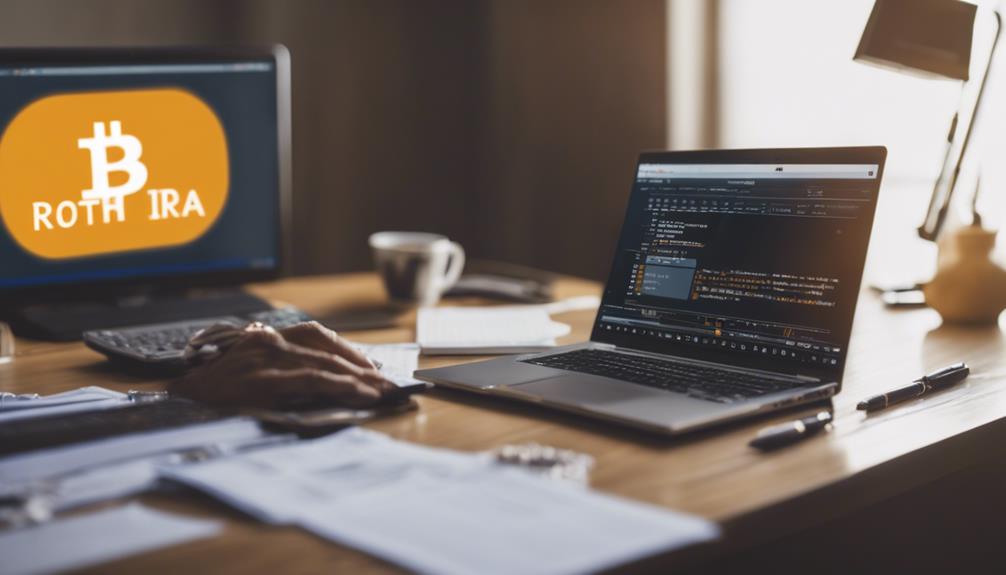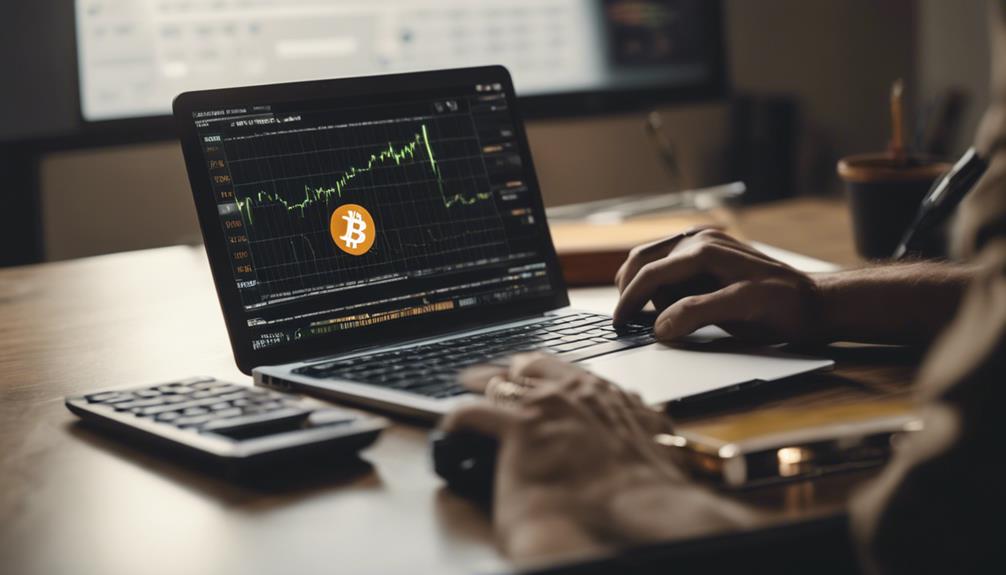Incorporating Bitcoin into our Roth IRA requires following key steps for long-term financial growth. Start by familiarizing yourself with Roth IRA basics and determining eligibility for Bitcoin investment. Open a Self-Directed IRA account, select a trustworthy cryptocurrency custodian, and securely transfer funds. Protect digital assets with private key security and hardware wallets. Keep up-to-date on market trends, regulations, and ensure regulatory compliance. Periodically adjust our IRA portfolio to match financial objectives. Seeking advice from financial advisors can offer tailored guidance. Each step plays a role in a strategic plan for a diverse and prosperous retirement portfolio. Additionally, it’s important to stay informed about the tax advantages and potential risks associated with holding digital assets in your retirement account. When you buy Bitcoin in a Roth IRA, any future gains can grow tax-free if all IRS guidelines are followed, providing a unique opportunity for maximizing wealth. Regularly reviewing your investment strategy ensures your portfolio remains aligned with your retirement goals and risk tolerance.
Key Takeaways
- Consult with a trusted advisor for personalized Roth IRA guidance on Bitcoin incorporation.
- Open a Self-Directed IRA account with a reputable custodian supporting cryptocurrency transactions.
- Transfer funds securely to your IRA, ensuring compliance with contribution limits and custodian guidelines.
- Understand tax implications for tax-free growth opportunities with Bitcoin in a Roth IRA.
- Safeguard digital assets with secure private key management and hardware wallets for enhanced protection.
Understanding Roth IRA Basics

Let's explore the fundamentals of Roth IRAs to understand the key aspects of this retirement savings vehicle. Roth IRAs differ from traditional IRAs in that contributions are made with after-tax dollars, meaning you won't be taxed on qualified withdrawals in retirement. This tax-free advantage makes Roth IRAs an attractive option for those seeking financial freedom in retirement. However, it's important to note that Roth IRAs have income limits for eligibility, so it's vital to check if you qualify based on your income level.
One significant benefit of Roth IRAs is that they don't have required minimum distributions (RMDs) during the account owner's lifetime. This flexibility allows you to manage your retirement savings on your terms without being forced to withdraw a certain amount each year. Additionally, Roth IRAs offer tax advantages that can help you maximize your long-term retirement savings potential. These tax benefits can provide you with more financial freedom and security as you plan for your future.
Assessing Eligibility for Bitcoin Investment

When considering eligibility for investing Bitcoin in a Roth IRA, it's important to understand the income limits set by the IRS. Meeting these limits determines whether one can take advantage of this investment opportunity.
We'll explore the criteria overview, compare investment options, and emphasize the importance of consulting with an advisor for personalized guidance.
Eligibility Criteria Overview
Determining eligibility for Bitcoin investment within a Roth IRA involves examining income limits and contribution thresholds set forth by the IRS for the tax year. For 2021, income limits for Roth IRA contributions range from $125,000 to $140,000 for individuals and $198,000 to $208,000 for those married and filing jointly.
Contribution limits stand at $6,000 for individuals and $7,000 for individuals aged 50 or older. To verify eligibility, assess your earned income and filing status according to IRS guidelines. Check eligibility based on income sources and tax-filing status to confirm you meet the criteria for contributing to a Roth IRA, which is a fundamental step in considering Bitcoin investments within your retirement account.
Investment Options Comparison
To explore investment options for incorporating Bitcoin into a Roth IRA, one must consider the flexibility offered by self-directed IRAs compared to traditional providers. While traditional IRA providers may not allow direct Bitcoin additions, self-directed IRAs enable the inclusion of alternative assets like cryptocurrency.
Companies such as BitIRA, Equity Trust, and Bitcoin IRA facilitate the incorporation of Bitcoin in IRAs, offering more versatility for investors. Understanding the regulations and available options for holding Bitcoin in retirement accounts is vital for making informed investment decisions.
Given that only a few traditional Roth IRA providers support holding Bitcoin, self-directed IRAs are a popular choice for those interested in cryptocurrency investments. Acquiring it within the account is an option rather than direct contributions of Bitcoin to a Roth IRA aren't permitted.
Consultation With Advisor
Let's consult with a financial advisor to evaluate our eligibility for incorporating Bitcoin into our Roth IRA.
When discussing Bitcoin investment in your Roth IRA with a financial advisor, consider the following:
- Understand IRS Regulations: Advisors can shed light on the tax implications and rules surrounding Bitcoin in retirement accounts.
- Assessment of Investment Suitability: Determine if adding Bitcoin aligns with your risk tolerance, investment objectives, and long-term financial goals.
- Check Roth IRA Provider Policy: Confirm your provider allows for alternative assets like Bitcoin in your account.
- Professional Guidance on Tax Implications: Seek advice on the potential tax benefits and consequences of including Bitcoin in your Roth IRA.
Opening a Self-Directed IRA Account

How can one effectively open a self-directed IRA account to incorporate Bitcoin into their retirement portfolio?
When venturing into the domain of self-directed IRAs for alternative investments like Bitcoin, the first step is selecting a trustworthy custodian that supports cryptocurrency transactions. These accounts empower individuals to have more control and flexibility over their retirement portfolios, allowing them to diversify by including assets such as Bitcoin.
By opting for a self-directed IRA, investors have the freedom to align their retirement savings with personal interests in cryptocurrencies, paving the way for potential growth opportunities in this evolving financial landscape. Working with a custodian that facilitates Bitcoin investments can provide the necessary infrastructure and expertise required to navigate the complexities of incorporating digital assets into a retirement account.
Opening a self-directed IRA sets the stage for a more tailored and dynamic approach to retirement planning, offering the chance to explore alternative investment options beyond traditional assets.
Selecting a Cryptocurrency Custodian

When choosing a custodian for your cryptocurrency holdings in a self-directed IRA, prioritize expertise in managing digital assets securely. Here are some key considerations to keep in mind:
- Specialization: Opt for a custodian that specializes in holding cryptocurrencies within retirement accounts to make sure they understand the unique requirements of this asset class.
- Secure Storage: Look for custodians that offer secure storage solutions such as cold storage or multi-signature wallets to protect your digital assets from cyber threats.
- Trading and Management: Verify that the custodian allows for easy trading and management of your cryptocurrency investments, enabling you to make timely decisions about your portfolio.
- Insurance Coverage: Select a custodian that provides insurance coverage to safeguard your digital assets in the event of theft or loss, offering you peace of mind regarding the security of your investments.
Transferring Funds to Your IRA

When considering transferring funds to your IRA, it's crucial to understand the fund transfer process, IRA contribution limits, and the tax implications and benefits involved.
By following the procedures set by your IRA custodian and ensuring proper allocation to your Bitcoin investments, you can make the most of this opportunity.
Direct transfers offer a tax-efficient way to incorporate Bitcoin into your retirement savings without impacting your contribution limits.
Fund Transfer Process
To initiate the process of transferring funds to your Bitcoin Roth IRA, connect with your chosen IRA custodian or platform for verification. When transferring funds, follow these steps for a smooth process:
- Initiate Transfer: Begin the transfer process from your existing retirement account to your Roth IRA.
- Verify Eligibility: Validate that the funds can be invested in cryptocurrencies within a Roth IRA.
- Confirm Completion: Verify the completion of the fund transfer to enable investments in Bitcoin and digital assets.
- Follow Guidelines: Adhere to the specific instructions provided by your IRA custodian to transfer funds seamlessly for cryptocurrency investments.
IRA Contribution Limits
Let's make sure we're within the Roth IRA contribution limits when transferring funds to our IRA for potential growth and tax benefits. The IRS has set the 2021 limits at $6,000 for individuals under 50 and $7,000 for those 50 and older. These limits can change based on inflation adjustments.
Contributions to a Roth IRA are made with after-tax dollars, allowing for tax-free growth. It's important to adhere to these limits to avoid penalties and tax implications. Remember that exceeding the contribution limits can lead to unfavorable consequences, so staying within the set boundaries is essential for maximizing the advantages of your Roth IRA.
Tax Implications and Benefits
Transferring funds to our Roth IRA involves a strategic move from a traditional retirement account to a self-directed IRA, ensuring potential tax-free growth and withdrawals in the future. When contemplating this transfer, it's vital to consult with a financial advisor to maximize the benefits and navigate the process effectively.
Here are some key points to take into account:
- Understand the tax implications of transferring funds to a Roth IRA.
- Ensure compliance with IRS guidelines for a smooth transfer process.
- Take advantage of potential tax-free growth opportunities in the Roth IRA.
- Seek advice from a financial professional to make informed decisions regarding your retirement savings.
Purchasing Bitcoin for Your IRA

Considering the benefits of tax advantages and diversification, purchasing Bitcoin for your IRA through specialized companies like Bitcoin IRA or iTrustCapital offers a strategic way to tap into the potential growth of the cryptocurrency market. These platforms provide a secure and efficient method to buy and hold Bitcoin within your retirement account, allowing you to participate in the crypto market's potential upside.
By incorporating Bitcoin into your IRA, you not only diversify your retirement portfolio but also take advantage of tax benefits that come with investing through retirement accounts. It's vital to maintain compliance with IRS regulations when purchasing Bitcoin for your IRA to uphold the tax-advantaged status of your retirement savings.
With the increasing popularity of cryptocurrencies, having Bitcoin in your IRA can be a forward-thinking move to potentially enhance your retirement wealth while enjoying the flexibility and control over your investment choices.
Safeguarding Your Digital Assets

We must prioritize safeguarding our digital assets by securing our private keys and considering the use of hardware wallets for added protection.
Using secure, reputable cryptocurrency wallets and implementing multi-factor authentication are essential steps in maintaining the security of our Bitcoin holdings.
Regularly updating our security measures and staying vigilant against phishing scams are critical practices to protect against potential cyber threats.
Secure Your Private Keys
To protect your digital assets effectively, it's essential to safeguard your private keys by securely storing them offline in hardware wallets or cold storage solutions. When it comes to securing your private keys, consider the following:
- Avoid Sharing: Keep your private keys confidential to prevent unauthorized access to your cryptocurrency holdings.
- Backup Strategies: Implement robust backup procedures to guarantee you can recover your private keys in case of loss or damage.
- Password Security: Utilize secure password management practices to add an extra layer of protection to your private keys.
- Multi-Signature Wallets: Consider using multi-signature wallets for added security, requiring multiple approvals for transactions, enhancing the safety of your digital assets.
Use Hardware Wallets
Hardware wallets provide unmatched security for safeguarding your digital assets against online threats. These devices offer offline storage for cryptocurrencies, keeping them secure from hacking attempts. By storing private keys offline, hardware wallets greatly decrease the risk of unauthorized access to your Bitcoin holdings.
When necessary, users can easily access their funds stored in hardware wallets by connecting them to a computer or mobile device. Popular brands like Ledger and Trezor offer user-friendly interfaces, making it easy to manage and transact with Bitcoin securely.
Opting for a hardware wallet guarantees that your digital assets are kept secure and easily accessible, giving you peace of mind in managing your investments.
Monitoring Market Trends and Regulations

Staying vigilant on evolving market trends and regulatory changes is essential when incorporating Bitcoin into your Roth IRA. Here are four key steps to keep you informed and in control:
- Stay informed on IRS regulations: Since 2014, the IRS has been issuing guidance on cryptocurrencies in retirement accounts. Understanding these regulations is vital to guarantee compliance and avoid any penalties.
- Monitor cryptocurrency market trends: Keep an eye on the market trends to anticipate potential impacts on your Roth IRA investments. Being proactive can help you make informed decisions about your portfolio.
- Understand tax implications: Holding Bitcoin in a Roth IRA has tax implications. By understanding these implications, you can strategically manage your investments and optimize your tax benefits.
- Track regulatory changes: Regulations surrounding cryptocurrencies in retirement accounts are continuously evolving. Stay updated on any new laws or guidelines that may affect your holdings to adapt your strategy accordingly and ensure compliance.
Rebalancing Your IRA Portfolio

Regularly adjusting our investments to maintain the desired asset allocation is crucial when rebalancing our IRA portfolio. By rebalancing, we guarantee that our investments align with our risk management strategy and long-term financial goals. This process helps us manage risk by preventing overexposure to any specific asset class and seizing opportunities in the market.
Factors such as market conditions, investment performance, and changes in our financial situation should be considered when rebalancing our IRA portfolio. Consulting with a financial advisor can provide valuable insights and help tailor a rebalancing strategy based on our risk tolerance and objectives. Working with a professional ensures that our asset allocation remains in line with our evolving needs and market trends.
Consulting With Financial Advisors

When considering incorporating Bitcoin into your Roth IRA, seeking guidance from financial advisors becomes essential in maneuvering the complexities of this investment avenue.
Financial advisors offer personalized guidance tailored to your financial goals and risk tolerance. Here's how they can assist you in integrating Bitcoin into your retirement savings:
- Assessment of Your Portfolio: Advisors can evaluate your current retirement portfolio to determine the suitable allocation for Bitcoin within your Roth IRA.
- Tax Implications and Risk Assessment: They can explain the tax implications, potential risks, and benefits associated with including Bitcoin in your Roth IRA.
- Creating a Strategic Investment Plan: Advisors can help you develop a strategic investment plan that aligns with your long-term financial objectives when incorporating Bitcoin into your Roth IRA.
- Staying Informed: Consulting with financial advisors ensures you're up-to-date on market trends, regulatory changes, and best practices for managing Bitcoin investments in your Roth IRA.
Frequently Asked Questions
How Do I Add Bitcoins to My Roth Ira?
To add Bitcoins to your Roth IRA, we can't do it directly, but specialized companies like Bitcoin IRA or BitIRA can help. Consider a self-directed Roth IRA for more control.
Purchase Bitcoin with after-tax dollars for potential tax-free growth. Working with a custodian supporting cryptocurrency is essential.
Holding Bitcoin in your Roth IRA could be a smart move for long-term financial goals.
Can I Roll My IRA Into Bitcoin?
Yes, rolling over your IRA into Bitcoin is possible. This can be done tax-free, allowing for diversification in your retirement portfolio. Companies like Bitcoin IRA and BitIRA specialize in facilitating this process.
Can IRAS Hold Bitcoin?
Yes, IRAs can hold Bitcoin, particularly through self-directed accounts that allow alternative investments. Direct contribution of Bitcoin to a Roth IRA isn't permitted; it must be purchased within the account.
Traditional IRA providers may not enable Bitcoin inclusion, so self-directed IRAs are a better option. Companies like BitIRA, Equity Trust, and Bitcoin IRA specialize in facilitating Bitcoin integration into IRAs.
Can I Buy a Bitcoin ETF in My Ira?
Yes, we can buy a Bitcoin ETF in our IRA. It's like adding a high-tech tool to our financial toolbox.
Investing in Bitcoin ETFs through our IRA allows us to tap into the cryptocurrency market's potential without holding actual coins. This strategy can offer tax advantages and diversification benefits for our retirement savings.
It's a smart move for those seeking exposure to Bitcoin's price movements within the confines of their IRA.
Conclusion
Incorporating Bitcoin into your Roth IRA is a strategic move for long-term financial growth. Just like planting seeds in a garden, diversifying your retirement portfolio with cryptocurrency can yield fruitful results over time.
By following the 10 steps outlined in this article, you can navigate the process with confidence and set yourself up for potential success in the ever-changing investment landscape.
Stay informed, stay vigilant, and watch your investments grow.











